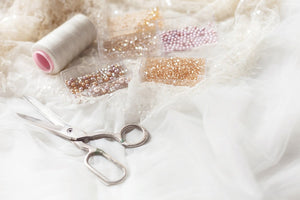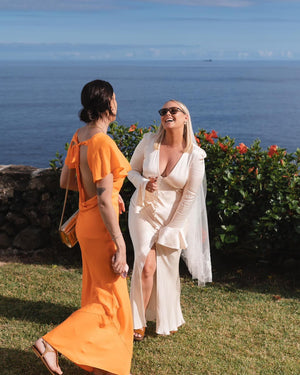You may also like
Choosing between white and ivory wedding dresses significantly impacts your veil selection. While white dresses represent traditional elegance, ivory offers a warm, romantic appeal.
Understanding this color distinction is crucial for creating a cohesive bridal look. The right color match between your dress and veil enhances your overall appearance and complements your wedding theme. Finding the veil color that matches your wedding dress ensures you achieve that picture-perfect bridal vision you've always dreamed of.
Ivory vs. White Wedding Dress: What’s the Difference?
Though people often use “ivory” and “white” interchangeably, they are not the same. Understanding the subtle differences between ivory and white can help you choose the color that flatters your skin tone and aligns with your overall bridal look.

Ivory Dress - Bride: Sofia Hirt - Georgia, USA - Veil: Kaitie - Photo: lovestoriesco
White Wedding Dresses
White has always been the go-to color for brides, symbolizing purity, elegance, and tradition. However, in recent years, pure white gowns have become less common in modern bridal collections. Nevertheless, you can still find classic white wedding dresses from brands like Pronovias and Christian Dior.
What Defines a White Wedding Dress?
- Bright, Clean Tone: A white wedding dress is crisp and striking, often described as "pure white," "off-white," “soft white," or "diamond white." White gowns typically have a bright, clean tone that captures attention.
- Light-Reflecting: White gowns tend to reflect more light, making them look even brighter, especially in natural sunlight.
It’s important to note that most white wedding dresses are not made in a true pure white. Under natural light, pure white can appear to have a bluish tint, which may not be flattering for all skin tones. Therefore, the majority of wedding dresses on the market tend to be in slightly off-white shades, still commonly referred to as white.
Pros of White Wedding Dresses:
- Timeless and Traditional: White gowns have always been a staple for brides who love tradition.
- Eye-Catching: The bright hue ensures you stand out, both in person and in photos.
Cons of White Wedding Dresses:
- Not Always Flattering: White can be harsh on some skin tones, especially for very fair or cool-toned brides, making them look washed out.
- Limited Versatility: The bright white shade can sometimes be tricky to match with certain accessories, decorations, or veils, which might create a look that feels a bit too bold or sharp.
Ivory Wedding Dresses
Ivory gowns have a softer, warmer feel and are now more common than pure white in bridal collections. The ivory shade adds a hint of romance and elegance without straying too far from tradition. Notably, renowned haute couture designers such as Monique Lhuillier, Oscar de la Renta, Mira Zwillinger and Berta have predominantly featured ivory tones in their 2025 wedding dress collections, showcasing the timeless allure of this trendy color.
What Defines an Ivory Wedding Dress?
- Warm Undertones: Ivory gowns can range from off-white to rich hues with subtle yellow, peach, or beige undertones.
- Popular Choice: Ivory has become the most common shade for wedding dresses, largely due to its flattering nature on all skin tones.
Pros of Ivory Dresses:
- Flattering for All Skin Tones: Ivory’s warmth complements almost every complexion, especially medium to darker skin tones.
- Romantic and Versatile: The rich tone pairs beautifully with delicate details like lace, beading, and embroidery, allowing those details to stand out.
- Modern Yet Timeless: Ivory strikes a balance between contemporary style and classic bridal elegance.
Cons of Ivory Dresses:
- Slight Color Shift: In certain indoor lighting, ivory can appear to have a yellowish tint, but this is generally minimal and doesn’t affect photographs.

Bride in an ivory gown with a matching lace veil - Bride: Beatriz Galvez - California, USA - - Photo: J Galvez
Why Brides Often Mistake Ivory for White
Many brides don’t realize their gown is ivory because it looks so similar to white in bridal stores under bright lights. It’s only in natural light that the warmer tones of ivory become more noticeable. That’s why it’s important to try on dresses in different lighting conditions to get a true sense of their color.
We recommend that you try on wedding dresses under both bright store lighting and natural light to accurately assess their colors. Moreover, trying on dresses in person will allow you to see how the dress color complements your skin tone.
Keep in mind that on your wedding day, you will also be wearing makeup, so be sure to take careful photos while trying on different dress colors. This way, you can easily compare and see which color dress suits your skin tone best, and how it matches with your makeup.
How to Match Your Wedding Veil with an Ivory or White Dress
Once you’ve chosen your dress, the next step is to find a wedding veil that complements it perfectly. At Tara Bridal, we offer a wide range of wedding veils in white, light ivory, and even some colored options.
Choosing the Color of Your Wedding Veil
- The Basic Principle: The fundamental principle is to choose the color of your wedding veil based on the color of your wedding dress. If your gown is white, opt for a white veil. If your dress is ivory, a light ivory bridal veil is the best choice.
Choosing Details on Your Bridal Veil
- Creating Harmony: If your wedding dress features intricate details like lace or embellishments, consider selecting a veil with similar patterns. This creates a cohesive look, linking the veil and gown while leaving a lasting impression on viewers.
- Minimalist Style: For simple, minimalist wedding dresses, you can choose any type of veil with lace, embellishments, pearls, embroidery, or even a pop of color to make a striking statement.

Bride in a traditional white wedding dress with a chapel-length veil. source: rusticweddingchic.com
Pro Tip from Tara Bridal Artisans and Designers
Send us images of your wedding dress via WhatsApp HERE when shopping for a wedding veil to receive our dedicated and enthusiastic advice for the perfect color and design match.
Key Factors to Consider When Choosing Between Ivory and White Wedding Dress
- Skin Tone: Your complexion plays a big role in whether ivory or white will suit you best. Ivory tends to be more flattering for a wider range of skin tones, while white can be more striking on brides with warmer undertones.
- Wedding Theme: The style of your wedding can also influence your choice. White dresses are often ideal for formal, traditional weddings, while ivory gowns work beautifully for a broader range of themes, from rustic to modern.
- Fabric: Different fabrics reflect ivory and white differently. Satin or silk in white can appear extra bright, while lace or tulle in ivory gives off a softer, more romantic vibe.

Conclusion: Which Color Complements Your Dream Veil?
Choosing between an ivory and white wedding dress doesn’t have to be daunting. Both colors are beautiful in their own way, offering unique advantages. Once you’ve decided on the dress color that suits your style, matching your wedding veil becomes easy with options from Tara Bridal.








